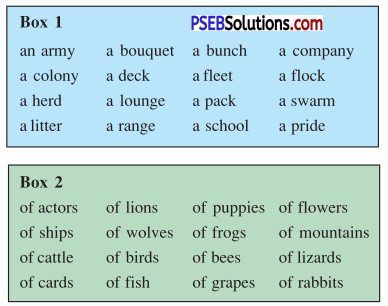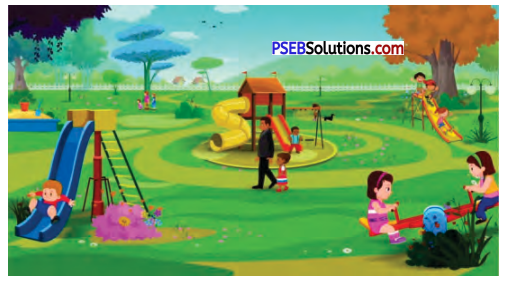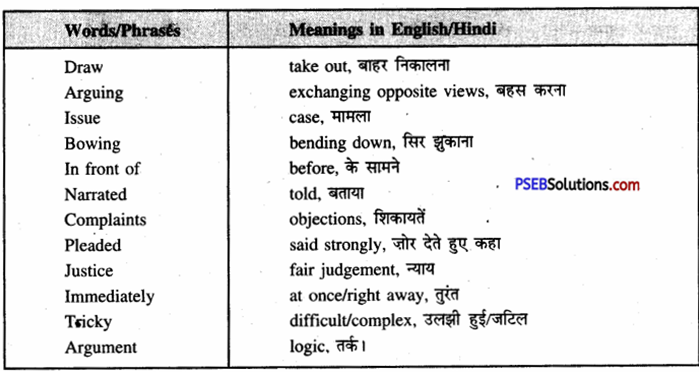Punjab State Board PSEB 7th Class English Book Solutions Chapter 1 Rent for Water Textbook Exercise Questions and Answers.
Class 7th English Solutions Chapter 1 Rent for Water Question Answers
Rent for Water Class 7 Questions and Answers
Activity 1.
Look up the following words in a dictionary. You should seek the following information about the words and put them in your WORDS notebook.
1. Meaning of the word as used in the chapter (adjective/noun/verb, etc.)
2. Pronunciation (The teacher may refer to the dictionary or the mobile phone for correct pronunciation.)
3. Spellings
| arguing | draw | bowing | pleaded | justice |
नोट :-
1. विद्यार्थी Lesson के आरंभ में दिए गए Word-Meanings पढ़ें।
2. Pronunciation के लिए अपने अध्यापक से निर्देश लें।
3. दिए गए शब्दों की Spellings याद करें और इन्हें बार-बार सीखने का अभ्यास करें।
![]()
Vocabulary Expansion
1. draw water (to take out water from a well)
I am thirsty. — Please let me draw water from your well.
2. Your Majesty (respectful words used when talking to or about a king or a queen)
(i) “Your Majesty ! I am a poor farmer. Please help me.”
(ii) His Majesty will soon arrive at the palace.
3. get justice (to be treated justly)
(i) People go to the court to get justice.
(ii) The farmer understood that he will get justice in the court.
4. instead of (in place of)
(i) There were green small lanes instead of busy streets.
(ii) There were big trees instead of tall buildings.
(iii) I think I will have tea instead of coffee today.
Activity 2.
Insert instead of in the following sentences, wherever needed :
1. Today, I will have butter jam on my bread.
2. By mistake, Sahib went to the railway station airport to pick up his friend.
3. I want to buy Samsung mobile Apple.
4. I wore blue socks red.
5. Rajinder had fresh cream custard.
Answer:
1. Today I will have butter instead of jam on my bread.
2. By mistake, Sahib went to the railway station instead of airport to pick up his friend.
3. I want to buy Samsung mobile instead of Apple.
4. I wore blue socks instead of red.
5. Rajinder had fresh cream instead of custard.
![]()
Learning to Read and Comprehend
Activity 3.
Answer the following questions :
Question 1.
Why did the farmer buy the well ?
किसान ने कुआँ क्यों खरीदा ?
Answer:
The farmer bought the well to water his fields.
Question 2.
Who did he buy it from ?
उसने इसे किससे खरीदा ?
Answer:
He bought it from his neighbour.
Question 3.
What was the argument between the farnier and his neighbour about ?
किसान और उसके पड़ोसी के बीच किस बात का झगड़ा था ?
Answer:
The argument between the two was about the water in the well. The farmer wanted to take out water. But his neighbour would not allow him.
Question 4.
Where did they go to solve the issue ?
इस मामले को सुलझाने के लिए वे कहां गए ?
Answer:
They went to the court of King Krishna Dev Rai.
Question 5.
What did the king do to solve their case ?
राजा ने उनके मामले को सुलझाने के लिए क्या किया ?
Answer:
The king asked the wisest minister of his court Tenali Raman to solve the case.
Question 6.
How did Tenali Raman solve the case ?
तेनाली रमन ने मामले को किस प्रकार सुलझाया ?
Answer:
He solved the case by doing justice to the farmer. He asked the neighbour to pay rent for his water in the farmer’s well.
![]()
Activity 4.
Read and answer the questions that follow :
1. The farmer bought the well so that he could water his fields.
Who is ‘he’ in the sentence ? ……………….
2. ‘I have sold you the well, not the water, so you cannot draw the water from it.’
What does ‘it’ mean in the sentence ? ……………….
3. They went to the court of King Krishna Dev Rai.
Who are ‘they’ in the sentence ? ……………….
4. He was listening to the complaints of the people of his Kingdom.
Who is ‘he’ in the sentence ? ……………….
5. I bought a well from him to water my fields.
Who is ‘him’ in the sentence ? ……………….
Answer:
1. The farmer
2. well
3. The farmer and his neighbour
4. King Krishna Dev Rai
5. The neighbour.
Activity 5.
Read the sentences taken from the story. Answer the questions that follow in the given blanks.
Question 1.
They decided to take the issue to the king.
What was the issue ?
Answer:
The problem of water in the well.
Question 2.
Why are you looking sad ?
Who was looking sad and why ?
Answer:
The farmer was looking sad because his neighbour would not let him take out water from the well.
![]()
Question 3.
I want justice, Your Majesty!
What was the farmer’s argument ?
Answer:
The farmer’s argument was that he had paid for the well so the water in the well was his.
Question 4.
Tenali Raman had solved this tricky situation.
How did Tenali Raman solve the problem ?
Answer:
He solved the case by doing justice to the farmer. He asked the neighbour to pay rent for his water in the farmer’s well.
![]()
Learning Language
The Noun : Revision
A noun is the name of a person, place, animal, thing, etc.
किसी व्यक्ति, स्थान, पशु, वस्तु आदि के नाम को Noun कहते हैं।
Let us look at some sentences.
- Divyam is a good dancer.
- New York is a big city.
- Animals are important for the existence of human beings.
The words in bold are nouns. They are the names of a person, place, animal or a thing.

Nouns के प्रकार – The ‘thing’ mentioned above may be concrete (a bag, a pencil, a pen – something that we can taste sight see and touch) or abstract (peace, honesty, goodness – something that we can only feel but cannot see or touch).
नोट:
1. जिन वस्तुओं को हम देख तथा छू सकते हैं उनके नाम Concrete Nouns कहलाते हैं।
2. जिन वस्तुओं को हम छू या देख नहीं सकते केवल अनुभव कर सकते हैं, उनके नाम Abstract Nouns कहलाते हैं।
Look at the picture given below :

In the picture above, the word “glee’ is an Abstract Noun. “The dog?, ‘the ball”, “the grass’ and ‘the sky’ that we can see are Concrete Nouns.
Examples (उदाहरण) of Concrete Nouns
1. people (जनसाधारण) — (man, woman, dentist, teacher)
2. animals (जानवर) — (cat, dog, bird, eagle)
3. objects (वस्तुएां) — (book, pencil, pen, blanket)
4. places and geographical features (स्थान तथा भौगोलिक विशेषतएां) — (mountain, valley, Punjab, India)
Examples ( उदाहरण ) of Abstract Nouns
1. qualities and characteristics — (beauty, kindness, wisdom)
2. emotions and states of mind — (love, happiness, anger)
3. concepts and ideas — (justice, freedom, truth)
4. events and processes — (progress, Friday, Diwali)
Collective Nouns are words that describe a group of people, animals or things.
| bunch | bevy | class | commitee | litter |


A particular type of Collective Nouns is called “Nouns of Assembly’. These are phrases that describe a group of animals, such as
‘Nouns of Assembly’
1. a pride of lions
2. a murder of crows
But sometimes people also make up funny or clever new ones such as
‘Nouns of Assembly’ एक विशेष प्रकार के Collective Noun होते हैं | ये प्रायः पशुओं के समूह को व्यक्त करते है, जैसे
3. a blister of shoes
4. a forest of books
![]()
Activity 6
Read the sentences below and underline the Concrete Nouns and encircle the Abstract Nouns.
C = Concrete, A = Abstract.
1. I felt pain when the surgeon put stitches on my arm.
2. I fell in love with that little puppy.
3. After lunch, Seema went to the market.
4. My mom will pick me up from school every week.
5. The kitten jumped upon the table and ate the cake.
6. Sanya’s childhood was painful.
7. I have full trust in my maid.
8. She is planting flowers in the garden.
9. That girl is very beautiful.
10. A dog is a loyal animal.
नोट : शेष विद्यार्थी Hints के अनुसार स्वयं करें।
Answer:
2. love (A), puppy (C)
3. lunch (C), Seema (C), market (C)
4. mom (C), school (C), week (A)
5. kitten (C), table (C), cake (C)
6. Sanya (C), childhood (A)
7. trust (A), maid (C)
8. flowers (C), garden (C)
9. girl (C), beautiful (A)
10. dog (C), animal (C).
Activity 7
Given below are two boxes. Match the words in box 1 with their collective nouns in box 2. (The teacher can also convert it into a group game by cutting out the word labels in both the boxes and asking the students to match them.)

नोट :-Box 1 के शब्दों का Box 2 के Collective Nouns से मेल कराएं।
Answer:
1. an army – of frogs
2. a colony – of rabbits
3. a herd – of cattle
4. a litter – of puppies
5. a bouquet – of flowers
6. a deck – of cards
7. a lounge – of lizards
8. a range – of mountains
9. a bunch – of grapes
10. a fleet -of ships
11. a pack – of wolves
12. a school – of fish
13. a company – of actors
14. a flock – of birds
15. a swarm of bees
16. a pride of lions
![]()
Learning to Listen
Activity 8
The teacher will read a story twice. You must number the sentences given below as the events happen in the story. You will mark the sequence in the space given after each sentence. Number one has been done for you.
Answer:
1. Ram said that the mango tree was his; while Sham said he owned it. (2)
2. Birbal understood- the situation. (4)
3. Unable to find a way out, they decided to ask Birbal for help. (3)
4. Upon hearing Birbal, Ram nodded and said he agreed to the suggestion (5)
5. He said, “The tree belongs to Sham because the very thought of cutting it down troubled him.” (8)
6. Someone who has cared for it for three years won’t cut it down. (9)
7. He told the brothers to remove all the mangoes, share them between the two brothers and then cut the tree in two equal halves. (5)
8. Birbal found out who the real owner of the tree was. However, Sham pled not to cut the tree for he had nurtured it for three whole years. (7)
9. Once, two brothers, Ram and Sham, were fighting over the ownership of a mango tree. (1)
Learning to Speak
Activity 9
Look at the words given below. They are commonly mispronounced. Learn to pronounce them well. Repeat the words after your teacher.
(The teacher must check the pronunciation before teaching.)

1. clothes – क्लोद्ज़
2. monkey – माँकि
3. picture – पिक्च्अ
4. bury – बरि
5. dengue – डेंगू
6. donkey – डंकी
7. village – विल्जि
8. heart – हॉट
9. tomb – टाँब
10. Wednesday – वेड्ज़डे
11. women – वुमेन्
12. develop – डिवेल्प
13. plumber – प्लम्ब्अ
14. truth – टूथ
15. coupon – कूपन
![]()
Learning to Write
Activity 10.
Look at the picture given below. Describe the picture in your own words in the given space. You can use the following words to describe the picture.
| park | children | playing | trees | green | slides | seesaw | clouds | sky |

This is a lovely park. There are two tall trees with green leaves. Near them there are some little plants and small trees. Many children have come. They are having fun in their own way. Some are playing. A child is walking with his father. Two girls are going up and down on a sea-saw. Some boys are enjoying themselves on slides. The weather is fine. Some clouds are sailing in the sky. The scene is lively and fresh.
Word-meanings : Enjoying-आनंद उठा रहे, Lively-जीवित, Weather-मौसम, Sailing-चल रहे।
Learning to Use Language
Activity 11
Giving Directions Read the following phrases :
1. Go straight ….. सीधे जाइए।
2. Take a right/left turn ……. दाएं/बाएं मुड़ जाएं।
3. Turn left/right …………….. बाएं/दाएं मुड़िए।
4. Go along the road……….सड़क के साथ-साथ चलते जाएं।
5. Go down this street …….. इस गली/ सड़क में (पर) जाएँ
6. Walk down ……….. पैदल चलते जाएं।
7. Next to the …………………. इसके आगे
8. Go past. ……………… (वहाँ से) गुजर जाएां
9. Until you come to the …………… जब तक आप (वहां तक) पहुंच नहीं जाते।
10. For about 1 kilometre …………. लगभग 1 कि०मी० तक
11. About three buildings away …. लगभग तीन भवन आगे
Study the following road map of Malad Mumbai. Give directions to Nanika standing on the Palm Court side of the Link Road to reach Goregaon Railway Station using the above mentioned phrases.

Answer:
1. Take the Link Road.
2. Go along it till you reach Chincholi Bunder Road.
3. Turn to the left and then to the right.
4. At a little distance, you will see a flyover bridge. Cross it and you are at Goregaon Railway Station.
Comprehension Of Passages
Read the given passages and answer the questions that follow each :
(1) Once upon time a man sold his well to a farmer. The farmer bought the well so that he could water his fields. The next day when the farmer went to draw water from that well, the man did not allow him to draw the water from it. He said, “I have sold you the well not the water, so you cannot draw the water from it.” They started arguing. When they could not solve the problem, they decided to take the issue to the king. They went to the court of King Krishna Dev Rai.
King Krishna Dev Rai was sitting in his courtroom. He was listening to the complaints of the people of his kingdom. The man and the farmer came inside the courtroom of the king and greeted the king by joining their hands and bowing in front of him. The farmer looked very sad. King Krishna Dev Rai asked him.“Why are you looking sad ? What is your problem ?”
![]()
1. Why did the farmer buy the well ?
किसान ने कुआँ क्यों खरीदा?
2. Why did the man not allow the farmer to draw water from the well ?
आदमी ने किसान को कुएँ से पानी निकालने की अनुमति क्यों नहीं दी ?
3. Choose true and false statements and write them in your answer book.
(a) They decided to take the issue to Tenali Raman.
(b) The King was listening to the complaints.
4. Complete the sentences according to the meaning of the passage.
(a) The man and the farmer came inside ………….
(b) The two men greeted the king by ……
5. Match the words with their meanings.
| (a) problem | objection |
| (b) complaint | agreement |
| difficulty |
Answer:
1. The farmer bought the well so that he could water his fields.
2. The man did not allow it because he said that he had sold the well, not the water.
3.
(a) False
(b) True.
4.
(a) The man and farmer came inside the courtroom of the king.
(b) The two men greeted the king by joining their hands and bowing in front of him.
5.
(a) problem — difficulty
(b) complaint — objection
(2) The farmer replied, “This man is my neighbour. I needed water for my fields. I bought a well from him to water my fields.” The king said, “Did you not pay him the money ?” The farmer said, “I did, Your Majesty ! With great difficulty. I had collected money to buy a well. I bought the well from him by giving him the money he had asked for.”
The King asked the man, “Did the farmer give you the money for the well ?”! The man said, “Yes, Your Majesty”. The king asked the farmer, “So what is the argument about, then ?”. The farmer said, “Now, he’s asking me to pay the money for the water too. The water in the well is mine now. Why should I pay him more ? I want justice, Your Majesty !
The king asked the neighbour, “What is this ? Is it true?”’ The neighbour also pleaded, “Yes, Your Majesty! I sold him the well, but not the water inside it.” The king found the problem very interesting and asked Tenali Raman, the wisest minister of his court, to solve it. Tenali Raman then, said to the neighbour,“ We understand that you sold your well to the farmer but not the water.”’
1. How much money did the farmer pay for the well ?
किसान ने कुएँ के लिए कितना पैसा दिया?
2. What did the neighbour say about the water ?
पड़ोसी ने पानी के बारे में क्या कहा ?
3. Choose true and false statements and write them in your answer book.
(a) The farmer collected the money easily.
(b) The neighbour wanted extra money for the water in the well.
4. Complete the sentences according to the meaning of the passage.
(a) The king found the problem ……
(b) Tenali Raman was the
5. Match the words with their meanings :
| (a) argument | hardships |
| (b) interesting | logic |
| funny |
Answers
1. The farmer paid as much money as his neighbour had asked for.
2. The neighbour said that he had not sold the water.
3.
(a) False
(b) True
4.
(a) The king found the problem very interesting.
(b) Tenali Raman was the wisest minister of the king’s court.
5.
(a) argument — logic
(b) interesting – funny.
![]()
(3) The wise minister looked at the farmer and said. “So, the well belongs to you and the water to your neighbour”. “Yes, Sir”, “said the farmer. “So is he giving you the rent for keeping his water in your well ?”’ asked Tenali Raman. “No, Sir”, said the farmer, smilingly. He had understood that he would get justice.
Tenali Raman said to the man, “Since you have kept your water in the well, you should pay the rent to the farmer or take out your water immediately. If you do not take out your water from this man’s well, you must pay two gold coins as rent to the farmer for keeping your water in the farmer’ well. And the farmer will pay you one gold coin every month for drawing the water from the well for his fields.”
King Krishna Dev Rai started smiling at how Tenali Raman had solved this tricky situation and done justice too. Tenali Raman proved that greed is not good and punished the neighbour for his dishonesty.
1. Was the neighbour paying rent for the water ?
क्या पड़ोसी कुएँ के पानी का किराया दे रहा था?
2. What did Tenali Raman prove ?
तेनाली रमन ने क्या सिद्ध किया ?
3. Choose true and false statements and write them in your answer book.
(a) The farmer understood that he would get justice.
(b) The king had solved the tricky situation.
4. Complete the sentences according to the meaning of the passage :
(a) Tenali Raman had solved the tricky situation and …..
(b) The rent for keeping water in the well was …………….
5. Match the words with their meanings :
| (a) immediately | at once |
| (b) rent | gladly |
| fee |
Answers:
1. No, he was not paying any rent.
2. Tenali Raman proved that greed (लालच) is not good.
3.
(a) True
(b) False
4.
(a) Tenali Raman had solved the tricky situation and done justice too.
(b) The rent for keeping water in the well was two gold coins.
5.
(a) immediately – at once
(b) rent — fee.
Use Of Words/Phrases In Sentences
1. Well (a water body)
We draw water from a well.
हम एक कुएं से पानी निकालते हैं।
2. Neighbour (person living nearby)
Sh. Maan Singh is my neighbour.
श्री मानसिंह मेरे पड़ोसी हैं।
3. Argument (reason, logic)
I don’t agree to your argument.
मैं तुम्हारे तर्क से सहमत नहीं हूँ।
4. In front of (before)
Our house is in front of a park.
हमारा मकान एक पार्क के सामने है।
5. Decide (resolve)
We decided to go for a picnic.
हमने पिकनिक पर जाने का फैसला किया।
6. Kingdom (a state)
Ashoka had a large kingdom.
अशोक का राज्य विशाल था।
7. Complaint (objection)
The officer did not listen to my complaint.
अफ़सर ने मेरी शिकायत नहीं सुनी।
8. Problem (trouble)
Tell me your problem.
मुझे अपनी समस्या बताइए।
9. Tricky (difficult/knotty)
I was caught in a tricky situation.
मैं एक कठिन परिस्थिति में फंस गया।
10. Collected (gathered)
Many people collected round the magician.
जादूगर के चारों ओर बहुत-से लोग इकट्ठे हो गए।
11. Looked at (saw)
The hunter looked at the bird and took aim.
शिकारी ने पक्षी देखा और उस पर निशाना बांधा।
12. Understood (knew/realized)
I understood his problem and helped him.
मैं उसकी समस्या समझ गया और उसकी सहायता की।
![]()
Word Meanings

Rent for Water Summary in Hindi
Once upon a time, …………………………………… is your problem ?
एक समय की बात है एक आदमी ने अपना कुआँ एक किसान को बेचा। किसान ने कुआँ इसलिए खरीदा था ताकि वह अपने खेतों को पानी दे सके। अगले दिन जब किसान कुएँ से पानी निकालने गया तो आदमी ने उसे पानी नहीं निकालने दिया। उसने कहा, “मैंने कुऔं बेचा है, पानी नहीं, इसलिए तुम इसमें से पानी नहीं निकाल सकते।” वे बहस करने लगे। जब वे अपनी समस्या का कोई हल नहीं निकाल पाए तो उन्होंने निर्णय लिया कि वे मामला राजा के पास ले जाएंगे। वे राजा कृष्ण देव राय की अदालत (दरबार) में गए।
राजा कृष्ण देव राय अपनी दरबारी अदालत में बैठे थे। वे अपने राज्य के लोगों की समस्याएं सुन रहे थे। आदमी और किसान राजा के दरबार में आए और उन्होंने उनके सामने हाथ जोड़कर तथा झुककर उनका अभिवादन किया। किसान बहुत उदास था। राजा कृष्ण देव राय ने उससे पूछा, “तुम उदास क्यों लग रहे हो ? तुम्हारी क्या समस्या है ?”
The farmer narrated ………….. the water inside it.
किसान ने राजा को सारी बात बताई। उसने दुःखी आवाज़ में कहा, “महाराज! मैं एक गरीब किसान हूँ। मेरे लिए दो वक्त का खाना जुटाना भी कठिन है। कृपया मेरी सहायता कीजिए।” राजा ने कहा, “ठीक है, मुझे अपनी समस्या बताओ।” किसान ने उत्तर दिया, “यह आदमी मेरा पड़ोसी है। मुझे अपने खेतों के लिए पानी चाहिए था। मैंने इससे अपने खेतों को पानी देने के लिए एक कुआँ खरीदा था।” राजा ने कहा, “क्या तुमने इसे कुएँ का भुगतान नहीं दिया।”
किसान ने कहा, “कर दिया था, महाराज! बड़ी मुश्किल से मैंने कुआँ खरीदने के लिए रुपया इकट्ठा किया था। इसने जितना रुपया मांगा था मैंने वो रुपया देकर इससे कुआँ खरीदा था।” राजा ने आदमी से पूछा, “क्या किसान ने तुम्हें कुएँ के बदले पैसे दिए थे ?” आदमी ने कहा, “हां, महाराज।” राजा ने आदमी से पूछा, “तो फिर बहस किस बात की है ?” किसान ने कहा, “अब यह मुझसे पानी के लिए भी पैसे मांग रहा है, कुएँ का पानी अब मेरा है। मैं इसे और पैसे क्यों दूँ ? महाराज! मुझे न्याय चाहिए।” राजा ने पड़ोसी से पूछा, “यह क्या कह रहा है ? क्या यह सच है ?” पड़ोसी ने भी जोर देते हुए कहा, “हाँ, महाराज! मैंने इसे कुआँ बेचा है, परन्तु उसका पानी नहीं।” .
The king found ……………… for his dishonesty.
राजा को यह समस्या बड़ी रोचक लगी और उसने दरबार के बुद्धिमान दरबारी तेनाली रमन से हल खोजने के लिए कहा। तेनाली रमन ने तब पड़ोसी से कहा, “हम समझ गए हैं कि तुमने अपना कुआँ किसान को बेचा है, परन्तु पानी नहीं।” आदमी ने कहा, “हाँ, श्रीमान।” तेनाली रमन ने कहा, “परन्तु तुमने कुआँ बेचा था और उसकी कीमत ले ली थी।” आदमी ने कहा, “हाँ श्रीमान्!” बुद्धिमान दरबारी ने किसान की ओर देखा और कहा, “तो कुआँ तुम्हारा है और उसका पानी तुम्हारे पड़ोसी का है।”किसान ने कहा, “हाँ, श्रीमान्।” तेनाली रमन ने पूछा, “तो क्या यह तुम्हें कुएँ में अपना पानी रखने के लिए किराया दे रहा है?” किसान ने मुस्कराते हुए कहा, “नहीं, श्रीमान्।” वह समझ गया कि अब उसे न्याय मिलेगा।
तेनाली रमन ने आदमी से कहा, “क्योंकि तुमने अपना पानी कुएँ में रखा हुआ है, इसलिए तुम्हें किसान को किराया देना होगा अथवा तुरंत अपना पानी बाहर निकालना होगा। यदि तुम इस आदमी के कुएँ से अपना पानी बाहर नहीं निकालोगे, तो तुम्हें किसान को उसके कुएँ में पानी रखने के लिए किराए के रूप में दो स्वर्ण मुद्राएँ देनी होंगी और किसान तुम्हें एक स्वर्ण मुद्रा प्रति मास अपने खेतों के लिए पानी निकालने के लिए देगा।” राजा कृष्ण देव राय मुस्कराने लगे कि किस प्रकार तेनाली रमन ने इस कठिन परिस्थिति को सुलझाया है और न्याय भी किया है। तेनाली रमन ने सिद्ध किया कि लालच अच्छा नहीं होता और पड़ोसी को उसकी बेईमानी के लिए दंड दिया।
![]()
Retranslation Of Isolated Sentences
1. The farmer bought the well so that he could water his fields. — किसान ने कुआँ इसलिए खरीदा था ताकि वह अपने खेतों को पानी दे सके।
2. When they could not solve the problem, they decided to take the issue to the king. — जब वे अपनी समस्या का कोई हल नहीं निकाल पाए तो उन्होंने निर्णय लिया कि वे मामला राजा के पास ले जायेंगे।
3. King Krishna Dev Rai was sitting in his courtroom. — राजा कृष्ण देव राय अपनी दरबारी अदालत
में बैठे थे।
4. The farmer looked very sad. — किसान बहुत उदास था।
5. The farmer narrated everything to the king. — किसान ने राजा को सारी बात कह बताई।
6. It is very difficult for me to get two meals everyday.– मेरे लिए दो वक्त का खाना जुटाना भी कठिन है।
7. I needed water for my fields. — मुझे अपने खेतों के लिए पानी चाहिए था।
8. I had collected money to buy a well. — मैंने कुआँ खरीदने के लिए रुपए इकट्ठे किए थे।
9. The water in the well is mine now. — कुएँ का पानी अब मेरा है।
10. The king found the problem very interesting. — राजा को यह समस्या बड़ी रोचक लगी।
11. He had understood that he would get justice. — वह समझ गया कि अब उसे न्याय मिलेगा।
12. Tenali Raman proved that greed is not — तेनाली राम ने सिद्ध किया कि लालच अच्छा नहीं होता।
English Guide for Class 7 PSEB Prose
